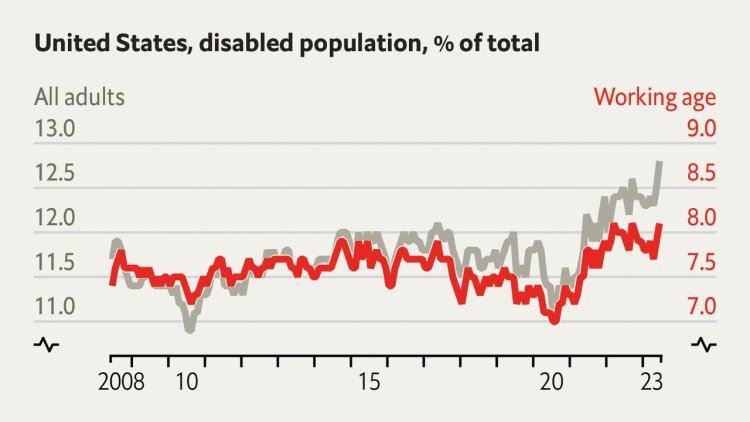More Americans than ever report a disability
Four charts that highlight this summer’s freakish temperaturesOur data team visualises the extreme heatTo read more of The Economist’s data journalism visit our Graphic Detail page.NOTHING SEEMS to be able to dent America’s labour market these days. A new analysis finds that the number of American adults reporting that they have a disability has risen sharply since the pandemic—but has not made them less likely to work. The number-crunching, by Andrew Hunter of Capital Economics, a consultancy, draws on data from the Current Population Survey (CPS), a monthly household survey conducted by the Census Bureau for the Bureau of Labour Statistics. Although the survey tends to focus on labour-force conditions, including employment and earnings, it also asks questions about disabilities. And the share of Americans reporting that they have “serious difficulty” in certain daily tasks has risen sharply since the pandemic, to nearly 8% for those aged 16 to 64, and 13% for those aged 16 and over—a


Four charts that highlight this summer’s freakish temperatures
Our data team visualises the extreme heat
To read more of The Economist’s data journalism visit our Graphic Detail page.
NOTHING SEEMS to be able to dent America’s labour market these days. A new analysis finds that the number of American adults reporting that they have a disability has risen sharply since the pandemic—but has not made them less likely to work. The number-crunching, by Andrew Hunter of Capital Economics, a consultancy, draws on data from the Current Population Survey (CPS), a monthly household survey conducted by the Census Bureau for the Bureau of Labour Statistics. Although the survey tends to focus on labour-force conditions, including employment and earnings, it also asks questions about disabilities. And the share of Americans reporting that they have “serious difficulty” in certain daily tasks has risen sharply since the pandemic, to nearly 8% for those aged 16 to 64, and 13% for those aged 16 and over—a record high (see chart).
Precisely why the pandemic has boosted disability rates is unclear, though the types of disabilities that are on the rise suggest that long covid is to blame. The CPS asks respondents to report whether they have “serious difficulty” in six categories: hearing; seeing; concentrating, remembering or making decisions; walking; dressing or bathing; and doing errands. Historically trends in such conditions have changed together over time. But, as Mr Hunter points out, from 2019 to 2022 the number of American households with working-age respondents reporting trouble concentrating, remembering or making decisions has risen much faster than the other ailments, from 6.3m to 7.3m. Long covid may be responsible since “brain fog”, or cognitive impairment, is one of its hallmark symptoms, according to researchers.
This is concerning. But it has not yet had the economic effects you might expect. Indeed, whereas in past recessions claims for disability insurance have typically gone up, after the pandemic such claims fell. The labour-force participation rate of working-age Americans with disabilities has increased too, from 33% before the pandemic to nearly 40% today. Here again covid is probably a factor. A paper published earlier this year by Ari Ne’eman and Nicole Maestas of Harvard University found that, as the job market improved in 2021 and 2022, previously jobless people with disabilities found work more quickly than their able-bodied counterparts, particularly in occupations that allow for remote work.
This suggests that the rising labour-force participation rate of Americans with disabilities can be attributed not only to tight labour markets but also to the widespread adoption of remote work in the wake of the pandemic. During the post-pandemic recovery, workers have found jobs to be abundant. People with disabilities are no exception.■
What's Your Reaction?













